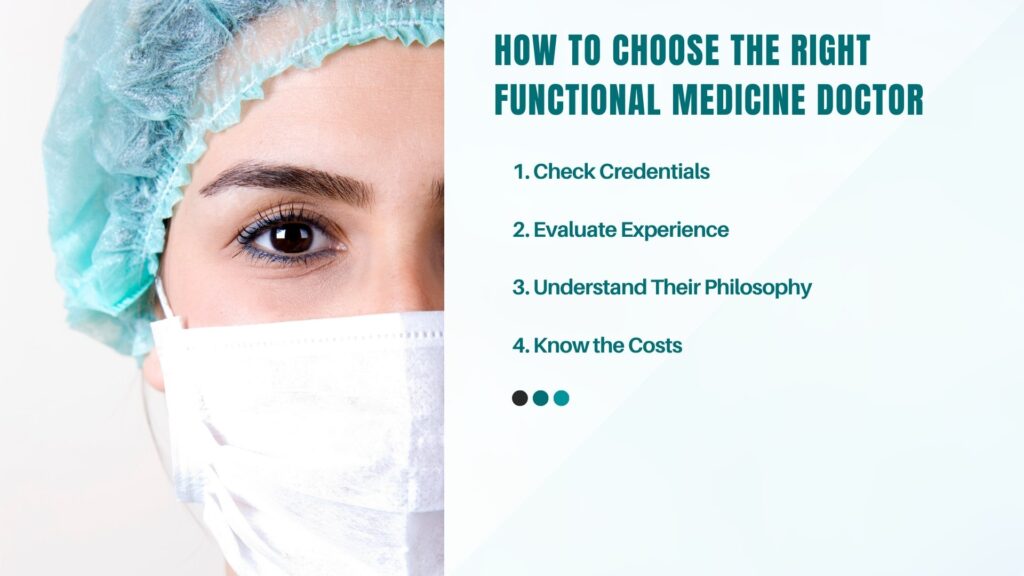Clearing Up the Confusion
When exploring new options for your health, you may come across the term functional medicine. This field is rapidly growing, prioritizing the search for root causes over simply managing symptoms. This approach sounds promising, but it often leaves people with an important question: Are functional medicine doctors real MDs? Do they have the same credentials and clinical Experience as your regular family doctor, or is the field something entirely different?
This guide will clarify what an MD is, who can call themselves a functional medicine doctor, the types of credentials you might encounter, and how to choose a provider you can trust for comprehensive care.
What Is an MD?
An MD (Doctor of Medicine) is a licensed physician in the United States who has completed years of demanding education and clinical training. To earn the title of MD and practice medicine, a doctor must:
- Complete four years of medical school
- Participate in a residency program that lasts three to seven years, depending on the specialty
- Pass national board exams to demonstrate medical competency
- Hold a valid license to practice medicine in their state or country
MDs are rigorously trained to diagnose and treat a wide range of illnesses, prescribe medications, perform procedures, and provide care in hospitals or private practices. There is also a very similar path: DO (Doctor of Osteopathic Medicine), which involves equivalent training but includes a slightly more holistic, bodywide approach—DOs can practice alongside MDs in nearly all medical settings.

What Is Functional Medicine?
Functional medicine is a type of medical practice designed to identify the underlying causes of disease. Rather than merely treating the symptoms of the disease, the physicians in functional medicine practice, however, will take time to explore the numerous factors affecting a patient’s overall health, including:
- Nutrition and dietary habits
- Physical activity and daily routines
- Sleep quality and stress management
- Exposure to environmental toxins or allergens
- Gut function and hormonal balance
- Family health history and genetic predispositions
Appointments with functional medicine practitioners are often much longer than standard doctor visits. These providers may order advanced or specialized tests and recommend individualized plans that could include lifestyle modifications, dietary changes, nutritional supplements, stress management strategies, and—in some cases—medications.
Are Functional Medicine Doctors Real MDs?
In Many Cases—Yes
A significant number of functional medicine doctors are indeed MDs. They undergo the same rigorous traditional medical training as other physicians—completing medical school, residency, gaining licensure, and often achieving board certification in fields such as internal medicine, family medicine, or endocrinology.
So, are functional medicine doctors MDs in the traditional sense? In many cases, yes—they hold the same medical qualifications and legal authority as any other medical doctor.
Many MDs become interested in functional medicine because they want to offer more comprehensive, personalized care than conventional models often allow. They typically pursue additional specialized training through organizations like the Institute for Functional Medicine (IFM) or the American Academy of Anti-Aging Medicine (A4M).
When your functional medicine provider is an MD (or DO):
- They can run lab tests, order imaging, and interpret complex results.
- They are legally able to diagnose and manage complex conditions.
- They can prescribe pharmaceuticals when needed and recognize when more conventional or emergency interventions are necessary.
You benefit from both the depth of medical knowledge and a more holistic, personalized approach to your care.
But Not All Are MDs
The field of functional medicine is multidisciplinary. Not everyone practicing it holds an MD degree. Other credentials include:
- DOs (Doctors of Osteopathic Medicine): Licensed and trained similarly to MDs, with additional emphasis on holistic care and the musculoskeletal system.
- NDs (Naturopathic Doctors): Receive four years of training focused on natural therapies but are not licensed as physicians in all states, with limited or no prescribing rights.
- DCs (Chiropractors): They specialize in musculoskeletal health and sometimes offer functional medicine guidance, but generally lack the authority to prescribe medication.
- Nurse Practitioners (NPs) and Physician Assistants (PAs): May have functional medicine training and provide valuable care, but with different legal rights and oversight requirements.
Key Point: While anyone can study or practice aspects of functional medicine, only MDs and DOs are licensed to deliver a full spectrum of medical care—including diagnosing, prescribing, and managing complex cases—in most of the United States. If you’ve ever asked yourself, Are functional medicine doctors MDs with full legal authority?—The answer depends on their exact credentials.
How to Choose the Right Functional Medicine Doctor
Finding a functional medicine provider who matches your needs and credentials expectations is essential. Here’s how to ensure you make the right choice:

1. Check Credentials
- Confirm whether the provider is a licensed MD or DO.
- Ask for certifications from reputable organizations such as the Institute for Functional Medicine (IFM) or other accredited programs.
- Look for board certification in a medical specialty.
2. Evaluate Experience
- Inquire about their years in practice and whether they have Experience treating conditions similar to yours.
- Find out if they often collaborate with conventional healthcare teams—including your current doctors or specialists.
3. Understand Their Philosophy
- Do they blend standard Western treatments with holistic or natural approaches?
- Will they work with you to build a long-term wellness plan focused on prevention and overall well-being?
- How do they manage acute or urgent issues and coordinate with hospitals if necessary?
4. Know the Costs
- Ask what’s included in the first and follow-up consultations.
- Clarify whether recommended tests, supplements, or additional services are extra.
- Check if any part of your care is covered by insurance; many functional medicine practices are out-of-network, so you might pay out-of-pocket for some services.
What Sets a Functional Medicine MD Apart?
Functional medicine MDs frequently attract patients with challenging, chronic, or unexplained medical issues, such as:
- Autoimmune dysfunction
- Persistent digestive complaints (like IBS)
- Chronic fatigue or pain conditions
- Hormonal imbalances
- Long-standing skin problems (e.g., eczema, psoriasis)
What you can expect from a functional medicine MD:
- Longer appointments: The first visit often lasts 60–90 minutes to explore your health history in depth.
- Advanced testing: Investigations may include hormone levels, gut microbiome analysis, inflammation markers, food sensitivity panels, and more.
- Personalized treatment plans: Adjusted to your unique needs, these may include nutrition guidance, exercise recommendations, mind-body strategies, and only necessary medications.
- Minimizing prescriptions: They emphasize treating patients with medications only when absolutely necessary, focusing on treating root causes more holistically and bettering wellness in multiple ways.
Example:
A patient with chronic gut issues, fatigue, and mood swings might receive an antacid and antidepressant from a conventional MD. A functional medicine MD would likely perform comprehensive tests to check for food sensitivities, nutrient imbalances, and gut health—and then devise a holistic plan including dietary changes, stress management, and tailored supplements.
Functional vs. Conventional Medicine: What’s the Difference?
| Category | Conventional Medicine | Functional Medicine |
| Time Spent | Short visits, usually focused on addressing immediate symptoms | Longer, more in-depth consultations that explore full medical history and lifestyle |
| Treatment Goals | Aims to manage or suppress symptoms | Focuses on identifying and treating the root cause of the issue |
| Care Team | Typically doctor-centered, may refer to specialists as needed | Often includes a collaborative team—such as nutritionists, health coaches, therapists, and more |
| Patient Role | Generally passive—patients follow prescribed treatments | Actively involved—patients help shape and carry out their care plan |
| Testing | Relies on standard lab tests covered by insurance | This may include advanced, integrative, or specialized testing (like hormone panels, gut microbiome analysis, food sensitivities, etc.) |
What About Non-MD Functional Medicine Providers?
- NDs: Four-year doctoral education focused on natural therapies, but practice rights and prescriptive authority depend on state laws.
- DCs: Experts in spinal and joint care; some provide nutrition or functional guidance, but in most states, cannot prescribe medications or manage complex illnesses alone.
- Nurse Practitioners & PAs: Can provide excellent care in collaborative settings, especially alongside an MD, but have different practice limits.
If you have chronic health issues that are complicated or serious, prioritize MDs or DOs for comprehensive service and your safety. When in doubt, ask directly: Are functional medicine doctors MDs in this clinic?
Credentials Matter—Here’s Why
Your health is precious. Protect it by vetting your provider:
- Ensure they are licensed and in good standing with the state.
- Confirm the extent and source of both their medical and functional medicine training.
- Ask directly about what they are legally allowed to diagnose, treat, and prescribe.
Be especially cautious of:
- Anyone using “doctor” without clear ownership of their credentials.
- Providers who are not licensed in your state.
- Pressure sales for costly supplements or treatments that have weak medical evidence.
Good providers are transparent, accessible, and always open to your questions.
Final Thoughts: Choose Wisely, Stay Informed
Functional medicine is shifting the conversation in healthcare by asking deeper questions and considering the whole person. If you want this comprehensive approach, it’s generally safest to work with a functional medicine doctor who is also an MD or DO. That way, you’re protected by their broad expertise, licensure, and medical authority—especially important for complex or evolving concerns.
Do your homework: Review credentials, ask about training, clarify out-of-pocket costs, and don’t hesitate to meet with several providers before making a decision.
So, are functional medicine doctors MDs? Many are—but it’s your job to confirm who you’re working with so that you receive the safest and most effective care.
Frequently Asked Questions
Are all functional medicine doctors MDs?
No, many are, but some hold other credentials. Always verify your provider’s qualifications.
Can functional medicine MDs prescribe medications?
Yes. MDs and DOs have full authority to prescribe, order tests, and manage medical conditions.
Is functional medicine evidence-based?
Many approaches are rooted in current research, especially in nutrition, lifestyle medicine, and chronic disease. Some tests and treatments are still emerging and may not have universal scientific agreement.
How do I find a good functional medicine MD?
Seek board-certified MDs with recognized training in functional medicine (from IFM or similar organizations). Check online reviews, ask for referrals, and interview providers about their philosophy.
Will insurance cover functional medicine care?
However, several services (such as advanced testing or deeper consultations) may involve direct payment. Always check with your insurance provider and clarify costs upfront.